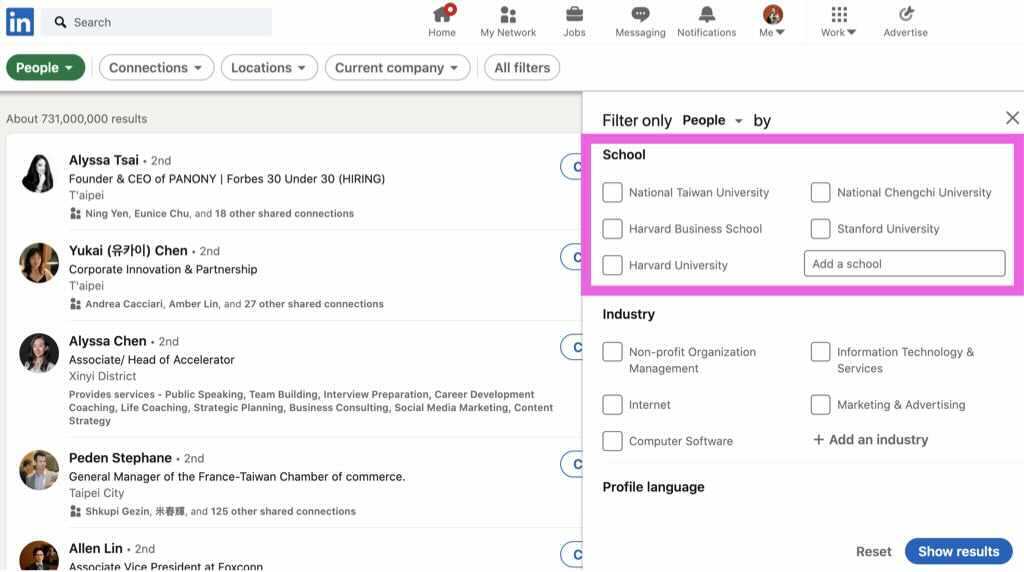The processes of selecting your target schools, applying and interviewing should involve a diligent approach to identifying programs that align closely with your unique career goals and framing each application in a way that portrays you as an ideal fit for that program. Many people start the process by consulting MBA rankings, reading message boards like The GradCafe or Chase Dream, and attending webinars and information sessions held by the schools. These are all excellent channels for gathering information, and we encourage you to utilize them. But the most valuable resource available to you is a school’s students and alumni network. There is no better way to learn all the pros and cons about a program than by speaking to people who studied there. Many programs offer to connect you with their ambassadors (here’s an example from USC Marshall MBA). Current students can provide the most up-to-date information on the details and curriculum of the program. Having completed the program and gone on to their careers, alumni can look back and identify which experiences and aspects of the program had the greatest impacts on their professional development.
How to Find and Connect with Alumni
You can take it upon yourself to seek out people to talk to by using LinkedIn. The site has powerful search functions that allow you to search by school name, location, industry, company and more.
Once you’ve identified an alumnus you’d like to talk to, send them a connection request, and be sure to include a note about why you are reaching out to them. Most alumni are proud of their school and will be willing to talk to you about their experiences there.
When Can a Student or Alumnus Be Most Valuable to You?
As you are creating your initial list of potential target schools, students and alumni can help you get a real understanding of what the program specializes in, what the classroom approach is like, and opportunities offered or created by the program that you might not find just by reading the program website. Once you’ve started your application process and are preparing for the interview, students and alumni can explain what kinds of strengths you will want to highlight in your answers, if the program values individualism or community spirit, and certain topics or initiatives that the program prides itself on.
What to Ask About
Most current students and alumni will share honestly about their experiences at the school. Take advantage of the chance to ask current students about the most popular courses and professors, recent changes to the curriculum and practical learning opportunities. Be sure to inquire whether the program values things like community involvement, innovation, or career development. Alumni are uniquely positioned to share how a program’s strengths and weaknesses shaped their experience and what the impact that has had on their career.
Do not overlook the fact that you are talking to someone who successfully applied for the program you are considering. Through your research, you will quickly learn that programs seek to create unique identities through industry specializations, value propositions, mission statements, campus life, and various commitments to community, diversity, curriculum, teaching styles and social causes. Understanding what is important to this university and this program can help you speak directly to these aspects in your essays and interviews.
Lastly, it can be especially helpful to international students to have an understanding of the campus life and community that they will be joining. Some schools, like Duke Fuqua, pride themselves on building a vibrant community within the program or cohort, while other programs can be so work-intensive that student connections are mostly forged by working together. For example, our previous client Violet shared in an interview that the first semester of her Master of Financial Analysis program at London Business School was so hectic with studies and applications for jobs and internships that it wasn’t until later in the year that she and her classmates had the chance to really socialize outside of class and the library. For many, campus life later evolves into membership in a large network of professionals who studied at the same university. Most schools pride themselves on fostering healthy alumni communities who can seek each other out even later in their careers, and you will want to ask about each school’s alumni network – their communications, events, community, etc.
[Conclusion]
It is best to take a comprehensive approach to selecting which schools to apply to, and we cannot overemphasize the importance of talking to students and alumni as a primary source of information in your school selection and application processes. If you’re preparing to apply for graduate, MBA or PhD programs and you’d like to learn more about the services we offer, sign up for a free 20-minute consultation today.


